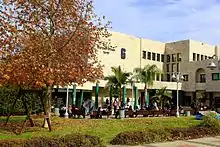Achva Academic College
Achva Academic College is situated within the area of the Regional Council of Beer Tuvia in southern Israel on the seam connecting the Negev desert region to central Israel.
מכללת אחוה | |
 | |
| Established | 1971 |
|---|---|
| President | Prof. Shosh Arad |
| Location | , Israel |
The college grants a range of bachelor's and master's degrees, as well as teaching certificates in a variety of fields. It is a recognized academic institution, accredited by the Council for Higher Education (CHE), and as a public institution is partially financed by the Planning and Budget Committee (PBC).
Approximately 3,500 students are enrolled at the college, 2,500 of whom are studying for academic degrees, and 1,000 of whom are studying in programs for professional certification, continuing studies programs, preparatory programs for completing high school matriculation certificates, and designated preparatory programs for students aiming to register for particular academic tracks.
History
Achva Academic College was established in 1971 by the Beer Tuvia Regional Council, [1] as a teachers' college. In the early 1970s, the college offered study programs for technicians and practical mechanical engineers, construction and industrial management, together with study programs in teaching including two-year tracks in early childhood education and one-year programs for aides in early childhood educational settings.
In 1993, the college was approved by the CHE to offer study programs under the academic supervision of Ben-Gurion University. This was followed in 1995 by the CHE allowing Achva to award B.Ed. degrees subject to its approval in early childhood, elementary and middle school tracks, from its departments of education, literature, history, mathematics, sciences, Judaic studies, Hebrew language, and special education. In 1998, the CHE approval became full accreditation for Achva to grant these degrees at its discretion. At the same time, Arabic, English, and computers were added to the fields in which Achva was authorized to grant B.Ed. degrees.
Under the guidance of the CHE, in 1997, the college instituted a separation, administratively distinguishing the Academic College of Education from the college under the auspices and supervision of Ben-Gurion University.
An independent, non-profit association, by the name of Achva, was established in September 2000 under the academic auspices of Ben-Gurion University. Over the years, it conducted 12 general study programs for bachelor's degrees.
In 2009, Achva College under the auspices of Ben-Gurion University became recognized as an independent academic institution and was granted accreditation for awarding independent B.Sc. degrees in life sciences. As a result, two academic institutions were established on the same campus, one beside the other with separate management, presidents, executive directors, and separate employee labor committees.
By 2012, following a long process and the recommendation of the labor committees and the work of professional steering committees, a strategy was devised for the unification of the two colleges on the Achva campus. The CHE approved the unification that year under the name of Achva Academic College.
Over the years, there were programs at the college which were transitional passageways to Ben-Gurion University for excelling students. The college severed itself from the university in 2012 as the unified structure formed one distinctive college with two undergraduate schools – one in education and one in the sciences, and an additional school of graduate studies for master's degrees.
The School of Sciences
The School of Sciences grants bachelor's degrees for a variety of tracks of study in the fields of life sciences, social sciences and humanities.
Tracks of study in the School of Sciences
• B.A. in communication disorders • B.Sc. in life sciences • B.Sc. in life sciences with a specialization in agrotech and in environment and sustainability • B.Sc. in management information systems • B.A. in psychology • B.A. in psychology, human resources track • B.A. on a multidisciplinary track with evening studies and emphases on a combination of clusters of study, including: human resources, psychology, education, conflict and
crisis management, visual culture and art, Hebrew literature, history of ideas, history, folklore and popular culture, sociology, environment and sustainability
The School of Education
The School of Education grants bachelor's degrees in education (B.Ed.) and teaching certificates, for a variety of tracks of study and fields of specialization.
Tracks of undergraduate study in education
• Early childhood education • Special education • Elementary school education • Middle school education • Track for Arabic-speaking students
Fields of specialization on the various tracks of study
• Mathematics • English • Natural sciences • Literature • Hebrew language • History
School of Graduate Studies
The School of Graduate Studies grants master's degrees in education, M.Ed., and in teaching, M.Teach for a variety of tracks of study.
Tracks of study for masters' degrees
• M.Teach* and teaching certificate in the fields of mathematics, sciences, literature, language, or history. • M.Ed. in special education • M.Ed. in teaching Jewish culture • M.Ed. in math education for elementary school • M.Ed. in education management systems (tracks with and without theses)
- Granting of the degree is contingent upon approval by the CHE.
Research centers in combined and integrated fields of study
There are two research centers in combined and integrated fields:
The Center for Sustainability and Agrotech – conducting research and working in the fields of pedagogy and teaching for learning about environmental sustainability, life sciences, education, ecology, etc.
Center of Neuropedagogy – established in 2016 by a team of researchers at the college, headed by Prof. Isaac Friedman. The center combines intense study of articles on neuro research and its application to learning and teaching.